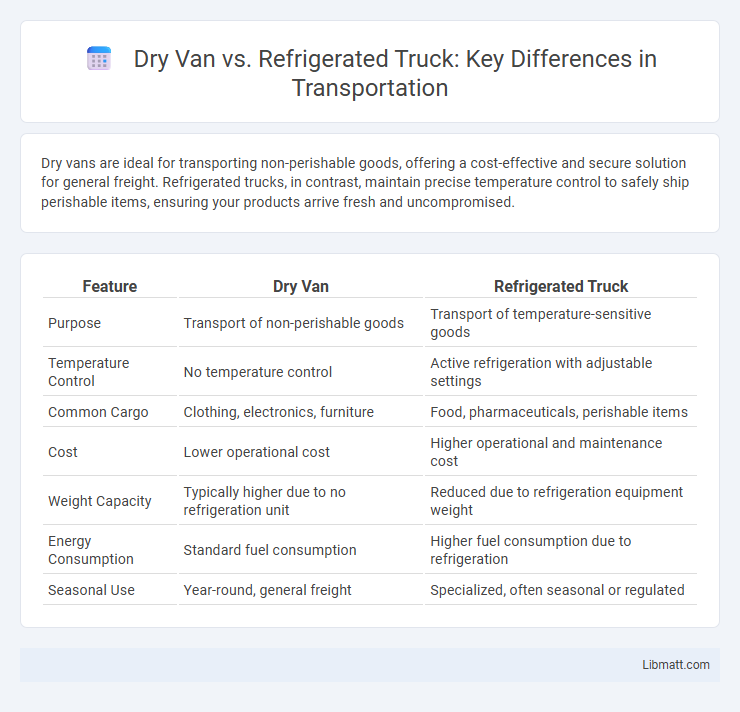Dry vans are ideal for transporting non-perishable goods, offering a cost-effective and secure solution for general freight. Refrigerated trucks, in contrast, maintain precise temperature control to safely ship perishable items, ensuring your products arrive fresh and uncompromised.
Table of Comparison
| Feature | Dry Van | Refrigerated Truck |
|---|---|---|
| Purpose | Transport of non-perishable goods | Transport of temperature-sensitive goods |
| Temperature Control | No temperature control | Active refrigeration with adjustable settings |
| Common Cargo | Clothing, electronics, furniture | Food, pharmaceuticals, perishable items |
| Cost | Lower operational cost | Higher operational and maintenance cost |
| Weight Capacity | Typically higher due to no refrigeration unit | Reduced due to refrigeration equipment weight |
| Energy Consumption | Standard fuel consumption | Higher fuel consumption due to refrigeration |
| Seasonal Use | Year-round, general freight | Specialized, often seasonal or regulated |
Introduction to Dry Van and Refrigerated Trucks
Dry vans offer secure, weather-protected transport for non-perishable goods, making them ideal for items like electronics, clothing, and furniture. Refrigerated trucks, or reefers, maintain precise temperature control essential for perishable products such as food, pharmaceuticals, and chemicals. Understanding the difference helps optimize your supply chain by matching cargo needs with the appropriate vehicle type.
Key Differences Between Dry Van and Refrigerated Trucks
Dry vans provide a temperature-controlled environment ideal for transporting non-perishable goods, while refrigerated trucks maintain a specific cold temperature for perishable items like food and pharmaceuticals. The insulation and cooling systems in refrigerated trucks increase operational costs and complexity compared to dry vans, which have simpler, cost-effective designs. Understanding these key differences helps you choose the right truck type based on your cargo's temperature sensitivity and budget requirements.
Cargo Suitability: What Each Truck Type Transports
Dry vans are ideal for transporting non-perishable goods such as electronics, clothing, and furniture, offering protection from weather but no temperature control. Refrigerated trucks, or reefers, maintain controlled temperatures for perishable items like food, pharmaceuticals, and sensitive chemicals, ensuring cargo integrity during transit. Choosing between dry van and refrigerated truck depends on your cargo's temperature sensitivity and storage requirements.
Temperature Control: Essential for Perishable Goods
Dry vans provide no temperature control, making them unsuitable for perishable goods that require consistent cooling. Refrigerated trucks (reefers) maintain precise temperature settings, ensuring the integrity of sensitive products like food and pharmaceuticals during transit. Choosing the right truck for Your shipment protects product quality and reduces spoilage risks.
Cost Comparison: Dry Van vs. Refrigerated Truck
Dry vans generally offer lower transportation costs compared to refrigerated trucks due to simpler design and reduced fuel consumption. Refrigerated trucks require specialized cooling systems, which increase both initial investment and ongoing maintenance expenses. Your choice impacts overall logistics budgeting, with dry vans suited for non-perishable goods and refrigerated trucks necessary for temperature-sensitive cargo.
Fuel Efficiency and Operational Expenses
Dry vans typically offer better fuel efficiency than refrigerated trucks due to their lighter weight and simpler aerodynamic design, resulting in lower operational expenses. Refrigerated trucks require continuous power to maintain temperature control, increasing fuel consumption and maintenance costs for refrigeration equipment. Your choice between these vehicles will impact fuel budgets and overall transportation expenses significantly based on cargo needs.
Market Demand and Industry Applications
Dry vans dominate the market for general freight transport due to their versatility and cost-effectiveness, with high demand from sectors like retail, manufacturing, and e-commerce. Refrigerated trucks cater to industries requiring temperature-sensitive logistics, such as food and pharmaceuticals, driving specialized demand for cold chain solutions. Your choice between dry van and refrigerated truck depends on the nature of your cargo and industry-specific requirements for temperature control and preservation.
Regulatory and Compliance Requirements
Dry vans and refrigerated trucks each face distinct regulatory and compliance requirements due to the nature of their cargo. Refrigerated trucks must comply with strict temperature control standards and often require additional certifications like HACCP or FDA regulations for transporting perishable goods. Your choice between these vehicles should consider these regulatory demands to ensure proper compliance and avoid penalties.
Pros and Cons of Dry Van vs. Refrigerated Trucks
Dry vans offer cost-effective, versatile transportation ideal for non-perishable goods, with advantages like lower fuel consumption and simpler maintenance, but lack temperature control, risking spoilage. Refrigerated trucks maintain precise climates essential for perishable items, ensuring product quality and safety, though they incur higher costs due to fuel, maintenance, and specialized equipment. Understanding these differences helps you choose the best option based on cargo type and budget considerations.
Choosing the Right Truck for Your Shipping Needs
Selecting between a dry van and a refrigerated truck depends on the nature of your cargo and temperature requirements. Dry vans are ideal for non-perishable goods, offering secure, weather-resistant transport for items like clothing and electronics. Refrigerated trucks maintain controlled temperatures crucial for perishable products such as food and pharmaceuticals, ensuring freshness and compliance with safety regulations.
dry van vs refrigerated truck Infographic

 libmatt.com
libmatt.com